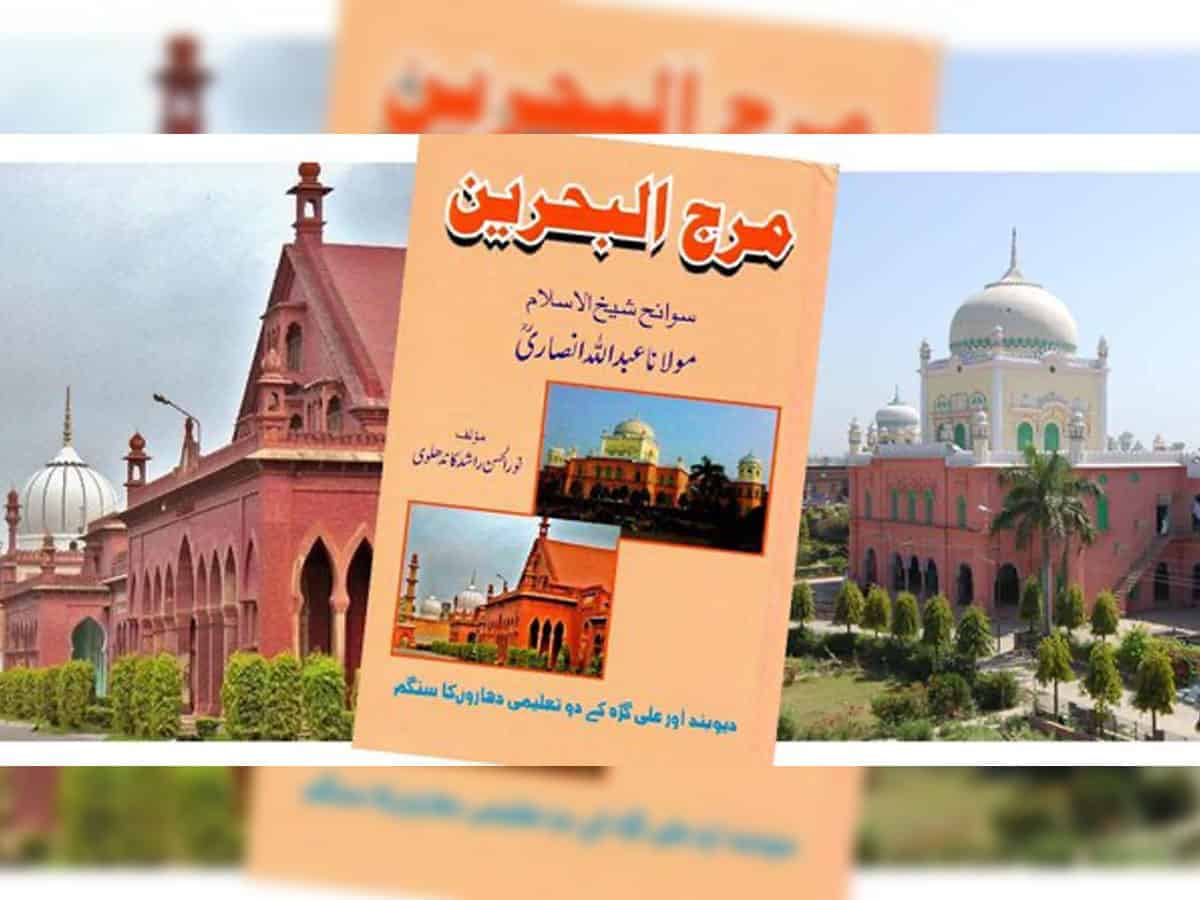
Almost 150 years have passed since Sir Syed launched his Aligarh Movement and established the Muhammadan Anglo-Oriental College (now AMU) in Aligarh. But sadly, the campaign of slurs, innuendoes, and ridicule against a sincere and committed benefactor of the community and a great educationist goes unabated. A section of Muslims continues, unabashedly, to stoke hatred against him. But in contrast to such a lot, some individuals study history with an open mind, analyse past events objectively and present facts as they have been recorded.
One such scholar is Noorul Hasan Rashid Kandhalvi, who has dug out and published rare information on the relationship between MAO College, Darul Uloom Deoband, and the founders of these two institutions in his book Marajul Behrain—literally meaning ‘merger of two oceans.’
The book is supposed to be a biography of Maulana Abdullah Ansari, a great scholar, who has gone missing in the pages of history. But it is also an invaluable documentation on the closeness and cooperation between Aligarh and Deoband in the early days of their inception and at a time when the divide between what is called secular education and religious education looked insurmountable.
Piles of books have been written on the hostility of Muslim theologian towards secular or western education. What has been described in these scholarly works is not entirely untrue. But the allegation that Deoband had declared an all-out war against Sir Syed is a brazen distortion of facts. The founder of Darul Uloom Deoband, Muhammad QasimNanautawi had not only refused to become part of the campaign against Sir Syed but went as far as to express his admiration for him and his work.
In addition to the rare and well-researched information provided by the author, Marajul Bahrain carries interesting articles by two great-grandsons of Maulana Abdullah Ansari—Late Dr Abidullah Ghazi and Muhammad Tariq Ghazi— Maulana Saud Qasmi, former Dean of Theology Department of AMU and by Dr Rahat Abrar, Former Public Relations officer AMU.
At the time when the storm raised against Sir Syed by Muslim theologians was at its peak, Maulana Qasim’s student, son-in-law and nephew took an even more daring step and joined Sir Syed’s MAO College. But this was not an easy decision. For this, he had to earn the displeasure of some of his spiritual guides. Giving an example of this Dr Abdullah Ghazi quotes Haji Imdadullah Muhajir Makki as having written toMaulana Rasheed Ahmad Gangohi:
‘I am surprised to hear about Maulvi Abdullah. Alas! Despite his claim to be a Sufi and the progeny of pious ancestors, he has joined the college which to the ulema-e-Akhirat [scholars whose all emphasis is on the hereafter] is [a symbol of] atheism and which is against faith and religion. And that, as you have written, he has joined the school of naturalists with my permission, is, all praise be to God, is a big accusation… Ulema-e-Akhirat do not regard those associated with this college as religious people. On the contrary, they view them as against religion, be they the scholars or the sons of pious ones…’
Dr Abidulla Ghazi writes:
‘Maulana Ansari had taken such a decision, against the advice of his spiritual guide, and in violation of the principles and etiquettes of [spiritual] allegiance, because of the bright prospects for propagation and preaching [of religion] in Aligarh. But neither Maulana Ansari broke his allegiance; nor did Haji Imdadullah excommunicate him from the circle of his vicegerents. However, it must have definitely affected his relations with Haji Saheb and other scholars of Deoband.’
But what was it that warranted Maulana Ansari to earn the displeasure of his spiritual guides? Dr Abidulla Ghazi writes, ‘(1) Maulana Abdullah Ansari’s joining Sir Syed’s mission earned it extraordinary support [from the laity as well as from the ulema]. Those who were so far reluctant [in cooperating with Sir Syed] joined his mission; those who were already associated with it, became fellow travellers; (2) By establishing a theology department and preparing a syllabus for it, following the established traditions of madrassas, he removed the prevalent doubts about Sir Syed’s beliefs. (3) Maulana Ansari’s presence in the institution and his teachings and training to the students created an atmosphere that protected [and promoted] ibadat [worship] and [Islamic] customs. (4) Several institutions in the country benefited from the academic status and work of Maulana Ansari. He made special contributions and provided guidance in the establishment and development of Nadwatul Ulema. (5) The presence of Maulana Ansari [in AMO College] served as a bridge between the ulema and modern intellectuals that paved the way for the mutual cooperation in future. (6) Maulana Ansari’s initial work paved the way for the establishment of Faculty of Theology with separate departments of Sunni and Shi’a theology, Islamic Studies, Arabic, Persian and Urdu.’
Abidulla Saheb adds:
‘Sir Syed’s extraordinary appreciation of the services rendered by Maulana Ansari may be judged from the fact that he came up to the expectations Sir Syed had of him and there was not even a slight dent in his respect [for Maulana Ansari] until his last breath [so much so that] he appointed him to be the Imam in his last journey. [He made a bequest that Maulana Ansari lead his funeral prayer.]’
As for those whose minds are unclear about Sir Syed’s mission even after 150 years, maybe this letter written by Sir Syed, before Maulana Ansari’s appointment would open their eyes. The book contains the full text of the letter. But because of its length, I am producing the translation of some excerpts from it:
‘…Madarsatul Uloom is a place where the majority of the youths are Muslims. Inculcating in them piety; inducing them to adopt high morals,in accordance to the teachings of the Holy Prophetﷺ; spreading the love for Islam, making them adhere to Islamic duties; creating in them aversion for violence, highhandedness, biases and prejudices,and leading towards godliness is a religious duty and highly rewarding [with God]… Maulvi Abdullah is the son of Maulvi Ansar Ali, grandson of Mamlook Ali, son-in-law of Moulvi Muhammad Qasim. I had personal acquaintance with these pious personalities. I hope that by virtue of being in the company of these pious figures, Maulvi Abdullah has imbibed these qualities and he will perform these tasks as his religious duty and by virtue of his lovefor Islam.… The tasks that I expect of him during his stay in the madarsa [MAO College] can be summarised as follows. Firstly, he manages the mosque’s affairs, and himself leads five times prayers… This will increase the number of students attending the congregation andenhance their zeal to attend congregational prayers. Secondly, [I expect him to] give a lecture after Friday prayer or, at times, after any of the daily prayers. The students of the College are themselves well educated and know various sciences. [Therefore] This will benefit them immensely if, from time to time, they are briefed about the high morals and noble practices of the Holy Prophetﷺ, virtuous deeds and the conduct of his companions and other religious scholars [and are told about the importance of] piety, love for God, performance of religious duties with sincerity; respect for parents and teachers, mutual sympathy among Muslims, the beauty and simplicity of Islam; Oneness and Greatness of God, the beauty of the Holy Qur’an and the teachings of the Holy Prophetﷺ … My real aim is to create love in the hearts of the students for daily-five-times-prayers, make them realise the importance of offering prayers with jama’t [congregation] and enthuse them with it… [I also want] Those who are absent from prayers be questioned and be persuaded to change their habit… Those who are absent from prayers without any [acceptable] justification… Maulvi Saheb [Maulana Abdullah Ansari] should talk to them privately, do some counselling and explain to them that they should pray and join the congregation … To be precise, in comparison to the worldly punishments administered by the Principal, such affectionate counselling would be more effective.’
These excerpts from a long letter penned by Sir Syed should leave no doubt in anyone’s mind about his real mission and about what he wanted to achieve through this college. Commenting on the impact of religious education and students’ attitude towards religion, Noorul Hasan Rashidi writes: ‘The need of instilling the importance of prayers in the hearts of the students, [asking Maulana Rashidi to] lead prayers himself, and the preaching and counselling that Sir Syed has emphasised upon in his letter, had started showing its effectiveness from the very early days…’
He writes: ‘Maulana Abdullah Ansari’s efforts had created such a discipline in the students that they had willingly become punctual in prayers and used to attend the mosque in such large numbers that the mosque used to be packed, and students were visible all around.’
To be continued
Marajul Behrain (Merger of Two Oceans)
Author: Noorul Hasan Rashid Kandhalvi
Pages: 256
Price: Rs 300
Publisher: Iqra Educational Foundation, A-2 Firdaus, 2 Veer Savarkar Road, Mahim (W) Mumbai 400016, India
Email: contact @iqraindia@org
M Ghazali Khan is a seasoned journalist and translator. He is interested in Middle Eastern and South Asian politics — especially Indian Muslims — history, media, culture and religion. Based in London, he has been running Urdu Media Monitor, a non-profit site.

